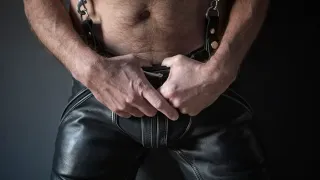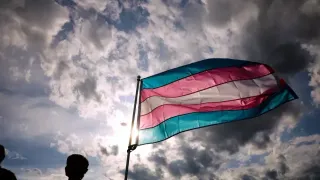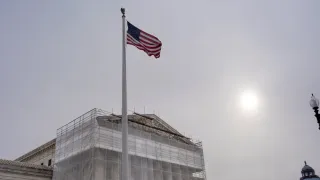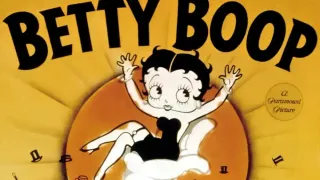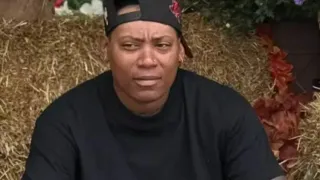September 30, 2019
A Surly Bear Speaks Out :: BDSM Mountain Poet and Essayist Jeff Mann on Being an 'Endangered Species'
Kilian Melloy READ TIME: 19 MIN.
Poet, essayist, short story writer, novelist... gay Appalachian writer and leather/BDSM enthusiast Jeff Mann fits all those literary descriptions, but he also fills in another and more rarified gap: That of an LGBTQ voice among America's "mountain folk."
Whether working out his rage against environmentally ruinous mountaintop-removal mining by penning fantastic tales of vampiric revenge, sharing thoughts and memories around his political opinions, literary musings, and sexual experiences in his books of essays, or penning lyrical poetry about manhood, virility, and masculine beauty in his collections of verse, Mann challenges stereotypical notions around rural and hill-folk culture. Not the monolithic and uneducated hicks of the popular imagination, Mann argues that his fellow Southerners of the Appalachian region may not be perfect (and their religiously-driven biases clearly enrage him), but they are as diverse, genuine in their connections (especially to family and to the land), and appreciative of beauty as anyone else... and, as his newest volume of essays, "Endangered Species: A Surly Bear in the Bible Belt" points out, as vulnerable to the forces of internalized self-loathing as other mocked and marginalized communities.
EDGE has followed Mann's work for years, and interviews with him have appeared here many times. Given that he draws unapologetically on his life and experiences for his essays and poetry, his calling as a writer and events around that work are also material for his essays; even so, it was with some startlement that this correspondent found himself named in the book's last essay, as Mann recollected and recounted a previous interview with this publication.
That moment of full disclosure now done, let us consider the new collection of essays. Mann mediates here more deeply on family and politics than in his previous collections of essays "Loving Mountains, Loving Men" and "Binding the God," and his willingness to bare his soul – and proudly proclaim himself as a bear in a world obsessed with less ursine modes of male beauty – shines through even more intensely. Older now, and with a confidence and wisdom that brooks zero bullshit, Mann takes on the country's divisions, polarized politics, and cultural riptides of political correctness and reactionary backlash with his own particular brand of insight. Masculinity has never seemed so muscular and self-possessed – nor so innately tender and hungry for sensation – as in Mann's newest clutch of writings.
EDGE had the chance recently – and, as always, the pleasure – of catching up to Mann to hear the stories behind the essays he's collected in his new volume.
EDGE: Reading these essays, I found myself thinking again and again of this question: Why are you a writer? And more specifically, why are you a poet?
Jeff Mann: I suppose I started writing poetry because my father brought me up to enjoy poetry and other forms of literature, and I thought I'd try it out. The first poem I wrote, "Crocuses Under Concrete," based almost entirely on an idea of my father's, I composed in Study Hall in the seventh grade at Hinton High School. After that, I wrote poetry to make sense of the erotic attractions I felt for certain handsome high-school classmates. And for decades after that, I wrote poetry in order to work through or to commemorate several forms of deep, difficult feeling. I've always been very emotional, for better or for worse.
These days, I'm no longer goaded by that insistent drive to express assorted passions, so I guess I keep writing poetry just to hold onto that identity: "I'm still a poet because I'm still writing poetry."
As for other kinds of writing, creative nonfiction is a way for me to process ideas, opinions, and feelings, and fiction is a way for me to get out of my life and my place and experience other lives and other places. I'm tired of being a middle-aged Appalachian? Then I can be a Scottish vampire, or a Rebel soldier, or a Viking berserker.
EDGE: Like your previous volumes of essays, "Endangered Species" has an almost radical feel of honesty and self-disclosure about it. Is this level of frankness something that comes naturally to you? Or is it a challenge you feel it's important to achieve?
Jeff Mann: More and more, it does come naturally. Though I can be a two-faced Southerner as much as anyone from my regional background (sweet to your face/snarky behind your back), putting up masks takes energy, and, as I've aged, I've been less and less willing to put energy into falseness and facades. It's much easier to tell the truth and be authentic. That said, yes, it's very important for a writer to be truthful, to be frank. God knows there's enough calculated inauthenticity and bald-facing lying in the world these days. Case in point: the "Orange Shitgibbon," a great insult I've borrowed for use in "Endangered Species."
EDGE: You cite your father's influence at one point for the frankness that characterizes your essays, but what else lies behind that ethos? Is it simply a matter of wanting to pare and plane your way right down to the rude, unapologetic truth?
Jeff Mann: Part of it's what I mentioned earlier: I don't have energy to waste on artifice. Part of it is that the art that I've found most nourishing – whether in songwriting or literature – is admirably honest and vulnerable, which is to say brave. So that's the kind of art I want to make and keep making, despite the often lukewarm to cold reception.
EDGE: In the book's first essay, "Romantic," you talk about your close relationship with your father and the way in which he shared his love of literature with you from an early age. Was your being gay (or kinky, or a bear, or a writer, for that matter) a source of strain between you and him?
Jeff Mann: My father was a flaming liberal, so it would have been out of character for him to be homophobic, though there was a little awkwardness at first. My parents had been having marital problems, and apparently, after some argumentation and a few glasses of wine, my mother proclaimed, "You don't even know your own children!" and told Daddy that I was gay. He was "shocked out of his mind," she reported.
Despite the unpleasant circumstances of that revelation, Daddy became supportive. He was fond of John, my partner since 1997, and he attended John's and my unofficial West Virginia wedding in late 2014 (as explained in my essay "Two Mountain Weddings"). And he published many an op-ed and essay in West Virginia newspapers defending gay people and gay rights.
EDGE: Is it common for gay boys in the South to maintain such close ties to their kin even if their being gay might create some family strain? Or have you and he been luckier than most in that way?
Jeff Mann: I've heard many a horror tale from other gay Southerners about how badly their families treated them once they came out, mainly due to their kin's homophobic religious convictions. Southern Baptists, ugh. The Baptist-blighted South, as I like to say.
I was very lucky, because my parents – free as they were of conservatism and religious bullshit – managed to cope semi-gracefully with the revelation of my homosexuality. My sister, Amy, the topic of another essay in "Endangered Species," has been super-supportive from the get-go. She was the first straight person I came out to, back in my junior year of high school. She's just as supportive now. I don't know what I'd do without her. She's one of the most important people in my life. Loyal Jones, in his famous essay "Appalachian Values," mentions an attachment to family as one of several positive mountain traits. He was, as the Brits say, "spot on" in that regard.
EDGE: Like son, like father: You relate how your dad was also the author of a well-received book of essays that he did not publish until late in life. Had he ever read your essays, fiction, and poetry? If he did, how did he respond?
Jeff Mann: Daddy actually published two essay collections, "Mann and Nature" (2011) and "Secular Mann" (2015). He might have read a few of my poems here and there, but, honestly, he was too busy with his own life and work to show much interest in mine.
EDGE: You talk about identity in different ways in the back-to-back essays "Country Queer" and "Letter to My Sixteen-Year-Old Self." Every writer has certain central themes that resonate through their body of work – is identity one of those themes for you?
Jeff Mann: It is, I suppose, simply because trying to juggle a very deep-seated Appalachian identity and a very frank gay identity... well, that's been complicated. I have that juggling act down now – I turned sixty in August 2019 – but there were a few earlier decades during which it was more difficult.
EDGE: Was the letter to your younger self a therapeutic exercise? Are you mending old wounds, writing what you wish someone had said to you at that age? Or is this a way of reaching out to others – who may indeed be sixteen right now – because you know what some of them need to hear from someone older and wiser, and more confident?
Jeff Mann: Actually, I wrote it as a writing assignment of sorts, because Matt Bright (who's beautifully designed my last several Lethe Press books) was the editor of a UK literary journal, "Glitterwolf," and he put out a call for submissions based on the "letter to my sixteen-year-old self" concept. I would hope that the piece would resonate with younger folks, but I'm not entirely confident that the essay will reach them. Distributing and getting publicity and recognition for gay books is pretty damned difficult, especially ones that contain frank depictions of gay sex.
EDGE: In that same essay you make the pointed observation that Christians in your neck of the woods tend to value "Old Testament judgment" over "New Testament love." This has always been a puzzle to me: How do self-described "Christians" justify what looks, from the outside at least, like a wholesale abandonment of Christianity's core messages?
Jeff Mann: Oh, sorry, I can't resist: Jesus Fucking Christ, that's a damned good question, especially at this point in the Trump regime.
I think it must be very difficult to be a real Christian these days. In fact, I know it is, because several of my Pulaski neighbors – wonderful folks who have made John and me feel entirely at home in the neighborhood – are Methodists who've been profoundly disturbed by that church's recent rejection of same-sex marriages and gay/lesbian clergy.
In Appalachia I've been surrounded by judgmental, hypocritical Christians all my life. Flesh-hating, woman-hating, gay-hating. I haven't read the Bible (I have many more useful and relevant books to get to), but I do have a pretty clear sense of what that rebellious Jewish hippie, Jesus, had to say... and – do I really need to say this? – the present contingent of rabid-dog Republican Christians are so far from Jesus that.... well, they're lower than a snake's belly, and, honestly, if I had superhero powers – Thor? Pyro? – I'd wipe every one of them off the planet. Sigh, no preternatural powers here. I guess I'll have to settle for fantasy.
EDGE: No Jeff Mann book of verse, essays, or fiction would be complete without at least one or two scenes involving bondage, and you offer that here with the essay "Thomas," about a lover. Reading this essay, I had a sense that some of your other writings involving BDSM have given me – that you are, in a way, writing what you wish there was more of in the world for your own reading pleasure.
Jeff Mann: I have indeed written about bondage in an attempt to create something that I would want to read, and I do hope that passionate, intelligent readers into "transgressive sexuality," as they say these days, will enjoy those publications. I myself am about done with that kind of material, sad to say. Eros is decamping.
EDGE: In that same essay, you effortlessly and quite deliberately couple bondage and profound, passionate emotional connection. This is something else about your work that's rare elsewhere: A way of imparting the sacred in the erotic, and the delicate in proclivities that carry a sense of implicit force. But what's also true is that the themes of strength and surrender are entwined in many flavors of eros. How is it that BDSM seems so outlandish to most people?
Jeff Mann: Not sure why BDSM is outlandish, since one particular author has recently published several frenziedly successful novels about straight-sex BDSM (very poorly written, as I've heard from assorted sources), and then movies were made, based on those novels, and how much money earned was that? So hooray for mainstream/straight leather-play! I can only dream of such royalties.
EDGE: Along those same lines, you also acknowledge that with time has come the understanding that your affair with Thomas – "the mythical Thomas," as you refer to him in several essays – was, in a way, another sort of BDSM: A kind of masochism, insofar as you yearned for someone who refused to make himself available to you. As painful and miserable as that was, could it possibly have been fulfilling any other way?
Jeff Mann: For years, I was almost exclusively attracted to emotionally unavailable men, and I don't think I'm alone in this neurosis. It seemed as if I could only entertain deep feelings for men who were bad for me. But yearning after an inaccessible beloved has been one of the prime goads for poetry for centuries, so I'm not unique in this regard either.
I got loads of writing material from that emotionally immature little man; he's appeared in my poetry, essays, and fiction in various forms. Just as importantly, I learned a lot about myself through loving him and in the agonized aftermath of loving him. An emotional education, I guess, a heart education. That's been hugely helpful in my maturation.
When I'm alone, after a few drinks, I tend to watch country-music videos online, and the two that remind me of Thomas and other unworthy men I've pursued are "Better Man" by Little Big Town and "Peter Pan" by Kelsea Ballerini. Check 'em out.
Looking back on the several men I've loved in my life, it's clear to me now that none of them were men who deserved to be the object of such devotion and such ardor. None of them except my husband, John, who is a man of such quality that the rest of them seem like inconsequential jackals in contrast. The country song I listen to when he's out of town and I'm getting my drink on is Lee Brice's "Eyes Closed," another tune worth checking out.
EDGE: You write in one essay: "I've spent my life not saying what I want to say, not making love to men I desire. Thus this essay." And yet, from a later entry in the book, "Offensive Hillbilly Queer" you say this: "I'll keep writing what I feel driven to write, however unsavory, offensive, and forbidden the topics might be." In yet another essay, you acknowledge the "myriad conflicting selves inside." Such tension is perhaps something required for any writer, but do you identify that as part of the drive to write?
Jeff Mann: The tension between selves? The tension between the desire to speak and the knowledge that such speech will be ignored at best, declared heretical, horrifying, and apostate at best? Yes, those tensions are certainly at the core of my creativity. Admittedly, those interior struggles get tiring sometimes. I'm constantly muttering, "Why the fuck do I bother?," especially when my publications are pretty much disregarded. By the way, I'm very thankful that you've taken such consistent interest in my work over the years and that you've interviewed me with some regularity.
EDGE: It's a pleasure to hear a gay Applachain voice, especially one so well versed in the various literary forms of essays, novels, and poetry. Which brings to mind this passage from your essay "The Feast Hall, The Arsenal, and The Mirror": "When I teach, especially when I am addressing students in Appalachian Studies courses or the Gay and Lesbian Literature course I created at Virginia Tech, I'm trying to save younger versions of myself from [a] lack of reflection..." You and Julia Watts recently edited a book of LGBTQ Appalachian fiction and poetry. Did this project tie into or come about from this same impulse?
Jeff Mann: It did. When I gave a reading at West Virginia University in April 2017, Abby Freeland, until recently an editor at WVU Press, offered me the opportunity to edit that anthology. I'd never edited anything before, simply because I'm selfish and want to use my time to focus on my own work. But I knew a collection of LGBT Appalachian writing had never been published, and I knew that such a book could be a great boon to queer folks inside and outside the region, so I agreed to do it. There were bumps in the process, but my co-editor Julia Watt's priceless sense of humor made a huge difference. I'm so glad she agreed to be my co-editor. Now there is indeed a book out there expressly made to give gay and lesbian hillfolk a literary reflection. I hope it makes a difference.
EDGE: Here's something else you say in "The Feast Hall, The Arsenal, and The Mirror": "As a gay man and as an Appalachian, I've often felt dismissed, mocked, or ignored.... I've felt starved, which is to say without sustenance." So if I may return to the first question: Why are you a writer? To feed the souls of those who find their way to your work? Or maybe also the act of writing feeds your own starved soul?
Jeff Mann: I write primarily for myself, to work out my thoughts and emotions and make my own meanings – and yes, in the fiction, I'm trying to live lives other than my own – so any effect my publications might have on others is secondary. That said, it may be secondary, but it's very, very important. The infrequent appreciative notes I get from readers mean a great deal to me.
EDGE: Reading your other works, especially your previously published book of essays, I did have the sense that Appalachians and gay people share a sense of internalized self-deprecation or even self-loathing, but "The Feast Hall, The Arsenal, and The Mirror" really brings that parallel home. It really is the case that LGBTQ people are not, in a way, treated uniquely; any group that's been stigmatized and marginalized can be made to experience internal discord and discomfort around their identity.
Jeff Mann: That's very true. I see that reflected this semester (Fall 2019) in my undergraduate students' creative nonfiction. Black, Puerto Rican, large-bodied, female, lesbian, rural... all those identities can be marginalized and made to feel uncomfortable, as my students' struggle-fraught writing makes clear. Appalachian scholarship and Appalachian literature are full of disturbing, annoying, or downright infuriating stories about Appalachians being stereotyped, mistreated, mocked, and talked down to.
EDGE: My favorite paragraph in the entire book: You're discussing how you feel your work is overlooked and had not received the readership it ought to. You write, "My husband, understandably weary of my incessant complaints, often points to the controversial nature of what I publish and politely suggests that I've chose my path and so should gracefully accept the consequences. Well, no! At the same time that I wouldn't do anything differently, if given the chance, I also reserve the right to snarl." But here's what I wonder: How much of your resentment stems from a feeling that what you have offered is not sufficiently appreciated, and how much comes from a feeling that the reason behind that lack of appreciation is tied up with hypocritical notions of what's "right," "decent," "appropriate," and "acceptable?" (As you go on to say in the same essay, "What's considered controversial and what's considered acceptable depend on context.")
Jeff Mann: Good question. Folks in the fields of Appalachian studies and Appalachian literature for the most part act like the only book I've ever published is "Loving Mountains, Loving Men," back in 2005. One of the reasons might be that it was pretty much ground-breaking, as one of the first books to discuss being gay in Appalachia; another reason might be that it's a university-press book (academics are all about university-press-published books and often dismiss everything else); but another reason might be that it's the least erotic of my books. Academics are obsessed with being politically correct these days – sickeningly so, in my opinion – but an open discussion of sex – much less kinky gay sex – unnerves them. I think that's why most of my books have been pointedly ignored by the Appalachian literary community. I certainly don't get the acclaim, the invitations to read at universities and at literary conferences and festivals, that many other mountain writers do, writers who have published significantly fewer books than I have.
In the metronormative LGBTQ++++++ community (yes, there's an ironic eye roll in there), well, I suspect I'm way too country to count for much. Plus, queer theory has changed gay and lesbian politics in ways I deeply disapprove of, as I make clear via infrequent snarly sideswipes in "Endangered Species." It can only get worse, which means I want less and less to do with that "community," such as it is. I'm sure those queer children concerned with all-important issues like "preferred gender pronouns," "micro-aggressions," and "misgendering" would regard me as a superannuated, reactionary dinosaur. Fine. I have no more use for them than they have for me.
EDGE: In the essay "Confederate," you write about your Confederate ancestors and the current popular loathing of Confederate monuments and the Confederate flag. You see those things as many do: Not as symbols of hatred, but concrete artifacts of heritage. With that in mind, when people bandy the notion that we're headed for a second civil war, how do you respond?
Jeff Mann: I don't think that's going to happen, but if it does, the rift won't simply be regional. I know loads of Southerners who hate Trump and his pack of corrupt warthogs as much as I do.
EDGE: I have heard it proposed – with perfect seriousness – that the USA is so culturally and politically divided that we really ought to split into two nations. What do you make of such a suggestion?
Jeff Mann: Well, there'd be a lot of geographical relocations and displacements, since, again, the divisions are too complex to categorize into This Region Is Conservative and That Region is Liberal. Contrary to often-held generalizations, there are lots of liberals in the South, and lots of conservatives in areas often thought of as pure bastions of liberalism. Plus, good luck getting Appalachians to leave their native hills in order to move somewhere else! We're notorious for our attachment to place and, as previously mentioned, to family.
EDGE: A still-raw flashpoint in the current culture wars – more volatile than ever – are the events that surrounded the "Unite the Right" rally in Charlottesville, in 2017. You wrote about this briefly, describing your initial delight at how the city was getting spanked for indicating it might remove Confederate statues – but when a white supremacist ploughed his car into a group of peacefully marching counter-protestors, you write, you directed your anger at the "white supremacists... carrying the flag my ancestors fought for to advance their racist rancor." You put your response brilliantly, I thought: "You nasty swine aren't my people.... Trash! Lee would have found you all vile."
Jeff Mann: I know that many of my opinions about all things Confederate will alienate a lot of readers, but I feel obliged to tell the truth and take a stand that other folks who might feel the same haven't taken, for fear of unpleasant consequences. Ironic: As I say somewhere in "Endangered Species," I've spent most of my career flashing the Right a defiant Fuck-You finger, and now I find myself doing the same to the Left with displeasing regularity.
Those white supremacists are swine. I count among my extended clan – those folks who have been kind to me and whom I care about – black folks, Jews, Iranians, Asians, Latinos, and Iraqis. Anyone who threatens them and hates them I'm bound to hate right back.
EDGE: You put the question to your readers, in addressing the perspective of Southern men who fought against the North: "What would you do if an army came through your area, your town or farm, torched the mills, factories, and civic buildings, burnt up your property, stole your food, and killed or carried away your animals?" It's a good question, and it makes me wonder why rural people you describe in your home town – as well as people in the North – don't seem to ask the question of themselves: What should LGBTQ folks do when homophobes come to their homes to erase their marriages, trash their ability to make a living, smear their good name, and tarnish their reputations? It seems to me we have every incentive, and every justification, to fight the hell back.
Jeff Mann: Testify, brother! Yes, exactly. And to think I used to be a self-professed pacifist in my youth. Decades of living in a homophobic world have made me angrier, tougher, and more full of fight than that tender, na�ve high-school kid I used to be could ever have imagined.
EDGE: That brings me to your final essay in the book, "Watch Out! That Queer's Got A Gun!," in which you describe buying a gun in response to Trump's election. Two years into his reign of error, do you still feel buying a gun was a proportionate and appropriate response?
Jeff Mann: "Reign of error," I love it. I have absolutely no regrets about buying those guns. I'd do it all again. My only regret is not getting to a shooting range more often, thanks to my recent sabbatical and various eye surgeries. I hope to get back to the range this fall. Whenever I travel in West Virginia and Virginia, states that honor my concealed-carry card, the smaller of my two Glocks is nestled sweetly inside my black-leather backpack, along with some ammunition. I like to think of myself not so much paranoid as prepared.
EDGE: I love the way you openly, frequently reference popular culture, from Tim McGraw to Anne Rice and "The Lord of the Rings." So let me end by asking your opinion about the most inflammatory topic of our fraught age: How did you like the finale for "Game of Thrones?"
Jeff Mann: John and I are several seasons behind on "Game of Thrones," and I've adroitly managed to avoid details about the apparently-very-controversial finale. (By the way, if you can arrange for Jon Snow to become my house-boy, that would be much appreciated.)
EGDE: In that case, how did you like "Avengers: Endgame?"
Jeff Mann: "Avengers: Endgame?" Holy fuck. It devastated me, just as I knew it would.
I read DC and Marvel comics when I was a kid, so those superheroes feel like old friends of mine. I've gone out of my way to watch and then collect on DVD all the movies that Marvel and DC have produced over the last decade or so, and those films have moved me deeply, for reasons I can only dimly comprehend. To see that story arc that began with the first "Iron Man" back in 2008 finally come to an end? Well, it was all I could do not to break down and howl/sob in the theater. Maybe I'll do that at home, if I can ever muster up the emotional fortitude to watch "Endgame" again. I'm so thankful for such moving, exciting, poignant storytelling.
"Endangered Species: A Surly Bear in the Bible Belt" is availabe now from Lethe Press.
